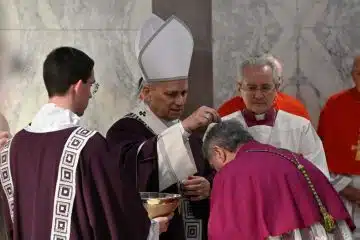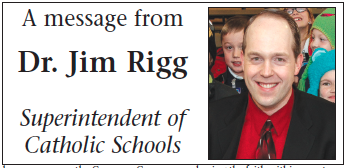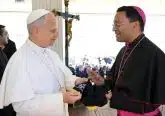Superintendent addresses Common Core concerns
Dear readers,
There has been a lot of conversation lately about the Common Core, a prevalent educational movement in the United States. The Common Core clearly seems to have caught the attention of many people in southwest Ohio; the topic comes up frequently when I speak to parents and Catholic school supporters, and I have received a number of questions about how the Common Core will impact teaching within the 114 Catholic schools of the Archdiocese.
As a Catholic school parent, and as an educator, I can understand the interest in the Common Core. Our schools have made a commitment to provide the best, most rigorous, most authentically Catholic education to the students we serve. How does the Common Core movement support this mission? How can we harness the Common Core to benefit the learning in our schools?
All teachers, within both public and private schools, are asked to teach students according to defined standards. These standards illustrate what students are supposed to know and be able to do by the time they leave a particular grade. Historically, teachers have been presented with a laundry list of instructional standards that they must sprint to cover by the end of the year. By offering instruction that is “a mile wide and an inch deep”, teachers have complained (and data has borne out) that students are emerging from schools lacking a deep understanding of key knowledge and skills.
The Common Core changes this, representing a fundamental shift in the teaching and learning process. The Common Core focuses intensely on a smaller number of standards that have been directly linked to success in college and career. Rather than running through a checklist of dozens of bureaucratic standards, students strive for true mastery in targeted areas. There is an emphasis on creativity, critical thinking, and real-world applications.
The Common Core began development in 2007, emerging out of conversations between states about aligning common standards. As the Core developed, universities and the national councils for subject areas (math, language arts, etc.) helped to identify key standards. In the years that followed, 45 states and over 100 Catholic dioceses integrated the Common Core into their own curriculum standards. The Army, the US Chamber of Commerce, the College Board, and many other organizations have publicly supported the Common Core.
In the Archdiocese, our involvement with the Common Core began in 2011. For many years, Catholic elementary schools have utilized a Graded Course of Study (GCS) developed by the Catholic Schools Office. Like all curricula, the GCS guides teachers on what students are supposed to know and be able to do by the end of the school year. The GCS for all subjects (with the exception of religion) is based upon the standards of the state of Ohio. We essentially take Ohio’s standards, ratchet them up to represent more rigorous instruction, and infuse them with our Catholic identity.
Two years ago, the state of Ohio began adopting the Common Core. Like prior years, we are adapting Ohio’s standards, which now include a tie to the Common Core, making them more rigorous, and infusing them with the Catholic faith. The vocabulary is important here: We are adapting, not adopting. As with any educational movement, we are taking the best of the Common Core and making it our own, to the ultimate benefit of our students.
Most of the concerns that have reached me over the past few weeks have revolved around the political dimensions of the Common Core. I have never seen the Common Core as a political issue. Some have suggested that the Common Core represents a political over-reach of the current federal administration. Others claim that the federal government will use data mining and other techniques to track students. I sense that certain groups are imposing political agendas onto the Common Core, and this has aroused great passion on both sides of the political spectrum. Regardless of the concerns, we are at liberty to use the Common Core as we see fit. As private schools, we can harness the benefits of the Common Core while avoiding any potential political entanglements.
Catholic schools have a longstanding and well-deserved reputation for academic excellence. Even more importantly, our schools have a proven record of passionately forming and awakening the faith within our students. I feel that the Common Core, adapted to fit our needs, provides an opportune complement to our mission. I am tremendously optimistic about the future of our Catholic schools. The release last fall of Lighting the Way: A Vision for Catholic Schools has filled our Archdiocese with energy and hope for the future of Catholic school education. Catholic schools are a beacon of hope for over 45,000 students in southwest Ohio, and I know that this success will continue for generations to come. God has blessed our schools, and I know that his continued blessing and inspiration will guide us far into the future.
Sincerely,
Dr. Jim Rigg
Superintendent














